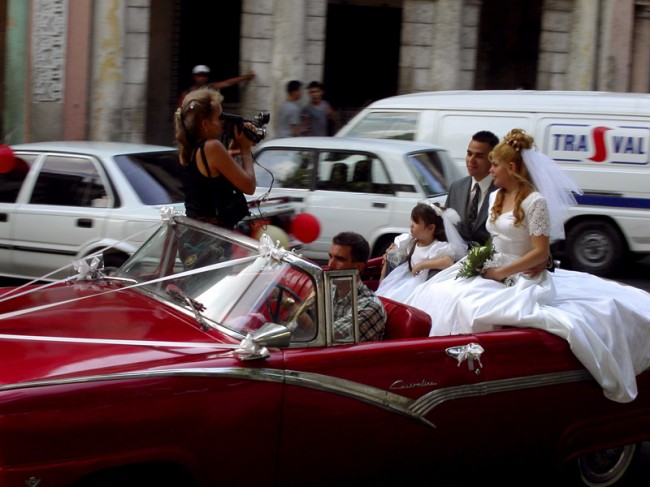
Diana, 25, has seen the same video hundreds of times on her Chinese television. And she still gets excited about the time when, dressed in white at the side of her future husband, she drove through the streets of Havana in a 1957 Cadillac convertible.
“It was the happiest moment of my life. Entering the matrimonial palace, the notary declaring us married, and those present asking us to kiss,” remembers Diana.
The modest hotel where they spent their honeymoon did not prevent them from having sex at all hours. Some months later, the marriage became a nightmare. Money was tight, and her husband suggested that she prostitute herself, discretely. “Darling,” he told me, “we cannot live in a virtual reality.”
Diana was very much in love. And she went to war. Her battle was to sleep with her husband’s friends, who lusted after her and were ready to pay 50 convertible pesos for one night. Later came foreigners who paid better.
As for material things, they went forward like the wind, but her love went out the window. “I had enough when a Russian offered me 120 dollars to screw me in front of my husband. The worst is that he accepted,” she said, indignant. Diana continued to prostitute herself, now on her own account.
Carlos, a sociologist, considers that one of the greatest harms caused by five decades of revolution has been the loss of traditional concepts about family and marriage, and the absence of ethical and moral codes.
“In the first years, the revolutionary discourse was very anti-Catholic. And the effort to give women more space in society brought promiscuity, with dorms in the country and the boarding schools, far from their families from a very young age. That created a frivolous feeling toward the institution of marriage,” pointed out the sociologist.
Ricardo, a notary, agrees with the sociologist. “In the Special Period, the number of marriages in Havana was spectacular. The reasons were simple. People got married because they had the right to buy three cases of beer and spend three days in a hotel where the lights didn’t go off and they could have breakfast, lunch and dinner. Most of the unions lasted two years on average. Others separated and didn’t even go to court,” affirmed the notary.
Then there are the cases of girls who get married for the extravagance. “I got married in church. To dress in white, with a tiara and veil, to take photos and make a video has become the fashion,” says Delia, a sculptor.
Others do it to imitate their parents. “I don’t understand how the old people have been able to last 45 years together. I tried it. But it was a fiasco,” confesses Rolando, a university student.
A female writer who asked to remain anonymous admits that “among my friends it’s normal that we sleep with the other’s spouse, with his consent. We even make love among ourselves. At times I tell my husband to go away, that tonight I need someone different in my bedroom.”
Carlos the sociologist wonders, So why get married? The answer can be what Ana, a primary school teacher, says. “To escape from your family and be independent.”
Couples have their reasons when they decide to go to the altar. The reality is that there’s an alarming tendency in Havana to get married. And later come the horrors, like the young writer who asks her husband to take a walk while she enjoys an orgy with friends.
Photo: Google images
Translated by Regina Anavy
January 13 2011
